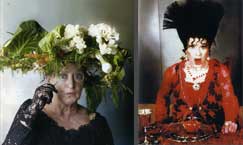Biesiada u hrabiny Kotłubaj
“This soup would have been rich and thick If the cook weren’t such a ...”
Written in 1928, the same year as Virginity, Dinner at Countess Pavahoke’s was part of the first book published by Witold Gombrowicz, the collection Memoirs from a Time of Immaturity (1933, Ed. Rój, Warsaw). The book was republished in an expanded version in 1957, which was re-titled Bacacay (Wydawnictwo Literackie, Kraków).

Witold Gombrowicz sheds light on this story in his preface to the 1933 edition of the collection, pulled from the text just before publication:
|
“In the grotesque ‘Festin,’ the Countess Pavakhoke and her guests eat a simple cauliflower, while a boy named Cauliflower wanders across the fields, approaches the window, and ends up dying there from exhaustion. The relationship between Cauliflower and the vegetable of the same name is purely formal and consists in the sounds of the word. The sense of the story rests on the idea that hunger and suffering of the poor Peter Cauliflower heighten the sense of taste of the aristocrats dining on cauliflower. The secret that my good vegetarian boy takes so long to discover is the natural cruelty of aristocracy.”“In the grotesque ‘Festin,’ the Countess Pavakhoke and her guests eat a simple cauliflower, while a boy named Cauliflower wanders across the fields, approaches the window, and ends up dying there from exhaustion. The relationship between Cauliflower and the vegetable of the same name is purely formal and consists in the sounds of the word. The sense of the story rests on the idea that hunger and suffering of the poor Peter Cauliflower heighten the sense of taste of the aristocrats dining on cauliflower. The secret that my good vegetarian boy takes so long to discover is the natural cruelty of aristocracy.”
“A Summary Explanation”, Varia [Trans Dubowski]
|

“Pavahoke” (“Kotłubaj”) is an authentic family name. It can be found in the 19th- and 20th-century telephone books of the Polish aristocracy, and belonged to a noble family from Eastern Poland. Witold Gombrowicz likely chose this name for its comic resonance in Polish: Kotłu- evokes a cooking-pot, as well as the verbs “to entangle,” “to mill about,” and “to pile.” However, titling her “Countess” is of the writer’s own design.

|
“I should mention in passing that this story, “Dinner at Countess Pavahoke’s—or ‘Countess Kotłubaj’s’ in Polish—almost got me involved in an affair of honor; for the Kotłubaj family, whose roots were somewhere in Lithuania, decided to call me out because of the various games I had played with their name in my story. The true source of my inspiration, however, was not them but a philanthropist and esthete well-known in Warsaw back then, the heiress Marta Krasińska.”“I should mention in passing that this story, “Dinner at Countess Pavahoke’s—or ‘Countess Kotłubaj’s’ in Polish—almost got me involved in an affair of honor; for the Kotłubaj family, whose roots were somewhere in Lithuania, decided to call me out because of the various games I had played with their name in my story. The true source of my inspiration, however, was not them but a philanthropist and esthete well-known in Warsaw back then, the heiress Marta Krasińska.
”Polish Memories [Trans. Johnston]
|
Excerpt: The manservants brought in an immense cauliflower dressed in fresh butter and marvelously browned—alas, on the basis of my prior experiences it could be surmised that it was a consumptive brown. Excerpt: The manservants brought in an immense cauliflower dressed in fresh butter and marvelously browned—alas, on the basis of my prior experiences it could be surmised that it was a consumptive brown. This was what conversation was like at the countess’s—what a feast it was even in such unfavorable culinary circumstances. I flatter myself that my assertion about Love being most beautiful was not the shallowest of assertions; I even believe that it could provide the crowning moment of many a long philosophical poem. But right away another dinner guest, raising the bidding, tosses out an aphorism that says Pity is more beautiful than Love. Excellent—and true! For indeed, when one thinks more deeply about it, Pity is even more encompassing, and covers more with its cloak, than sublime Love. And that’s not the end of it—the countess, our wise Amphitryon, concerned that we should not dissolve without a trace in Love and Pity, mentions our lofty obligations toward ourselves—and then I, subtly exploiting the rhyme on “-ation,” add just one more thing: “The White Eagle of our nation.” And the form, the manner, the way of speaking, the noble and refined moderation of the feast battles for the upper hand with its substance! “No!” I thought in delight. “Whoever has not attended one of the countess’ Friday parties cannot really say that he knows the aristocracy!” “The cauliflower is excellent,” murmured the baron, epicure and poet, all at once, and in his voice there sounded a pleasant surprise. “Indeed,” confirmed the countess, gazing suspiciously at her plate. As for myself, I did not notice anything out of the ordinary in the taste of the cauliflower; to me it seemed as wan as the preceding dishes.





